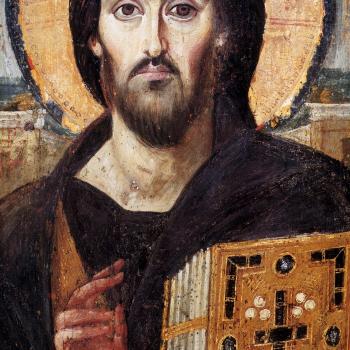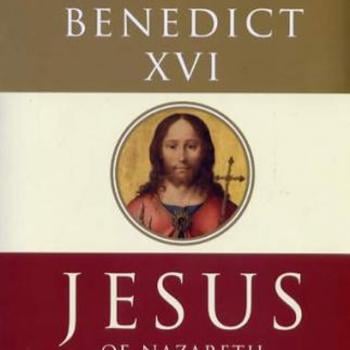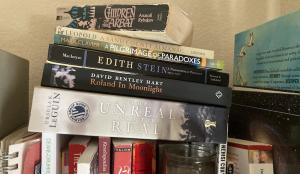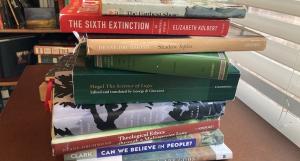Therefore the mind finds metaphor.
…
How I see better what
is there
after sitting quietly with what is not.
–Jeanne Murray Walker, “At the Ocean“
The poet is one who makes. It’s right there in the word, poesis, so it’s no use denying it. Poets picks up pieces of language, they give them a new rhythm and resonance, and so make a new meaning.
But could the poet also be one who discovers what’s truly there? Does the poet only create metaphor? Or, as Walker’s poem suggests, does she in some sense “find” it, as something already there, yet hidden? Can poetry reveal? Can there be a theology of poetry?
Praying as Discovering
To clarify what I’m asking, let’s linger for a moment with a thought about worship from Russian theologian Pavel Florensky. Reflecting on the communal prayers of Orthodoxy, Florensky says, “The liturgy was not invented; it was discovered.” Now, he clearly does not mean to deny that humans cut stones and built churches, or mixed paint for icons, or connected words to make prayers. Still, he doesn’t think that worship is just something humans made. The making didn’t begin with us. The things we do with stone and cloth and language is something like a response, or an echo, of something ancient and divine.
In fact, everyone who prays must mean something like this. We “discover” words, even as we use our minds to think of something to say. That’s because we don’t imagine ourselves as initiators of the conversation. Prayer is reply: that’s something I wrote about in Leaving Emmaus. Christians believe that life in the world is a constant invitation to find—to discover—ways to respond to the God who is always first speaking to us in the risen invitation of Jesus of Nazareth.
Two Kinds of Rhyme
But the poet? Is poetry pure creation, poesis? Or, like when I pray, can I also “find” the metaphors I create?
Let’s consider what it is that poets do. Kay Ryan, U.S. poet Laureate and Pultizer Prize winner, begins her poem “Linens” like this:
There are charms
that forestall harm.
First, we can thank her for the rhyme—how else would we know it’s a poem, right?
But what does the rhyme accomplish? What work does it do in my imagination? It alerts me, I notice, to a surprising intimacy between two things I wouldn’t normally put together. “Dog” and “bone” are words that I would pair. But “charm” and “harm”? The linguistic rhyme—made by removing the initial consonant sound and retaining the vowel-driven ending, invites me to consider what I’ll call an “ontological rhyme.” That’s an echo or match I can hear in the being, not just the sound, of the things. Maybe there is some connection of charm and harm that I’ve never heard before. So now I’m alert. I’m ready for the rest of her poem.
The house bristles
with opportunities
for stasis: refolding
the linens along
their creases, keeping
the spoons and chairs
in their right places.
The odd couple of charm and harm lets me notice another weird connection here. Can something bristle with opportunity for … stasis? What an odd thing to say. Do those images rhyme in their being? It’s as if she’s said here “I can hardly wait for nothing to change.”
Then again, isn’t that what a home is? A place where rest, return, and normalcy are the great bristling opportunities? Home is a paradox of energetic rest. It rhymes.
The Act of Napkins
There is another linguist rhyme in those lines above that reveals a new possibility in being: “stasis” and “places.” I didn’t know I was trafficking in that paradoxical rest-energy when I put things where they go (or fail to!) at home. Folding the linens along their creases (but not fitted sheets—those things won’t crease!), I am rushing toward the dream of stasis, of a place where predictability brings peace.
It’s all metaphor, and very creative. But as I read, I begin to suspect that Ryan is helping me discover something true even in the metaphors of linens, spoons, and chairs.
These are the charms, anyhow. But what is the harm all this forestalls? Here’s how her poem ends.
Nobody needs to
witness one’s exquisite
care with the napkins
for the napkins
to have been the act
that made the fact
unhappen.
There’s a bit of winking at all us homemakers in that first line: we who walk around muttering under our breath about the dishes and socks we find scattered about. No one needs to see all that care for the care to have power.
And then that brilliant final rhyme, linguistic (rhyme-sounding) as well as ontological (truth-naming). Those creased linen napkins are not just table decorations, but actions. The unseen folding is the act powerful enough to make the fact unhappen. The fact, I assume, is the harm from the second line. So the folded napkin creates the home, the homeo-stasis (see what I did there?), that resists chaos and hurt.
I see it now. Charm does make a being-rhyme with harm, but in a kind of opposite way: the arrangements of napkins and chairs is a “match” for those wild forces that threaten those who will live in this house. Linen creased: harm forestalled.
A Theology of Poetry
So much invention here. So much making, poesis. But is there also discovery? If the answer were no, it would mean that Ryan doesn’t believe what she said about those homey charms. If she does, then her invention is also revelation. To my ears, this is a poem about the mysterious secret that reveals itself in the making of a home. The mysterious connection—the rhyming—resonates with me. I have begun noticing the charms that forestall harm in my home since I first read it.
And this resonance is not just with me, I think, but is revealing something about creation. That’s what I mean by a theology of poetry. It’s what Florensky noticed in the liturgy. Sometimes humans can make things with all our creativity and skill that resonate not just with other makers, but also with the deep creating work of God. Liturgy can be discovered. Poetry can reveal.
When Ryan wrote her poem, I think God smiled and said, “Yes, napkins are like that, aren’t they? I suppose that is what I meant by them all along.”
For more on these ideas, take a look at these books by Rowan Williams and Catherine Pickstock.
















